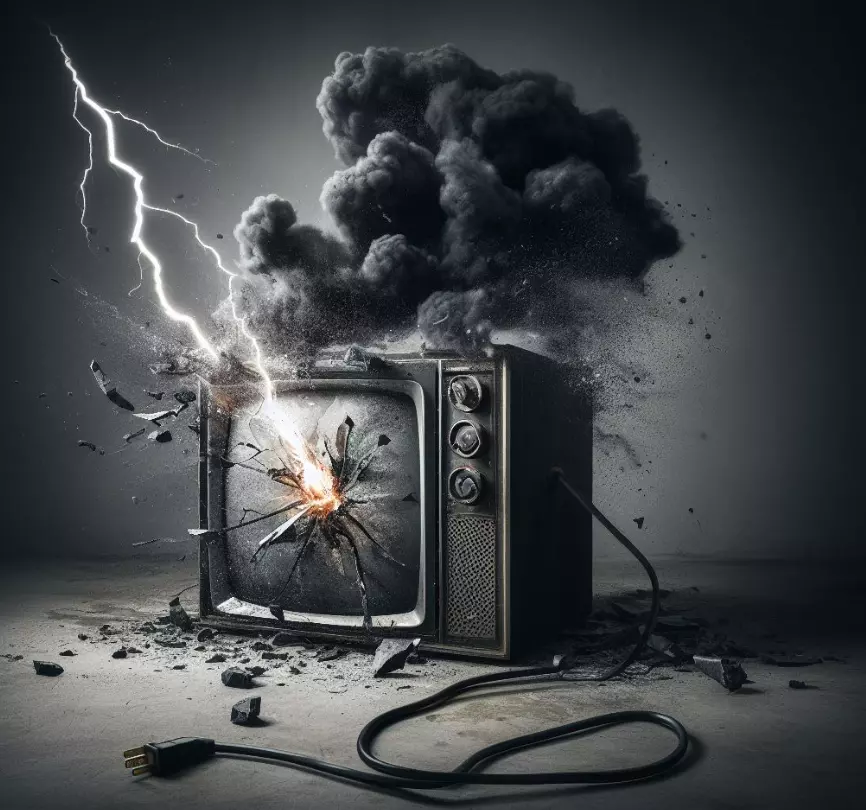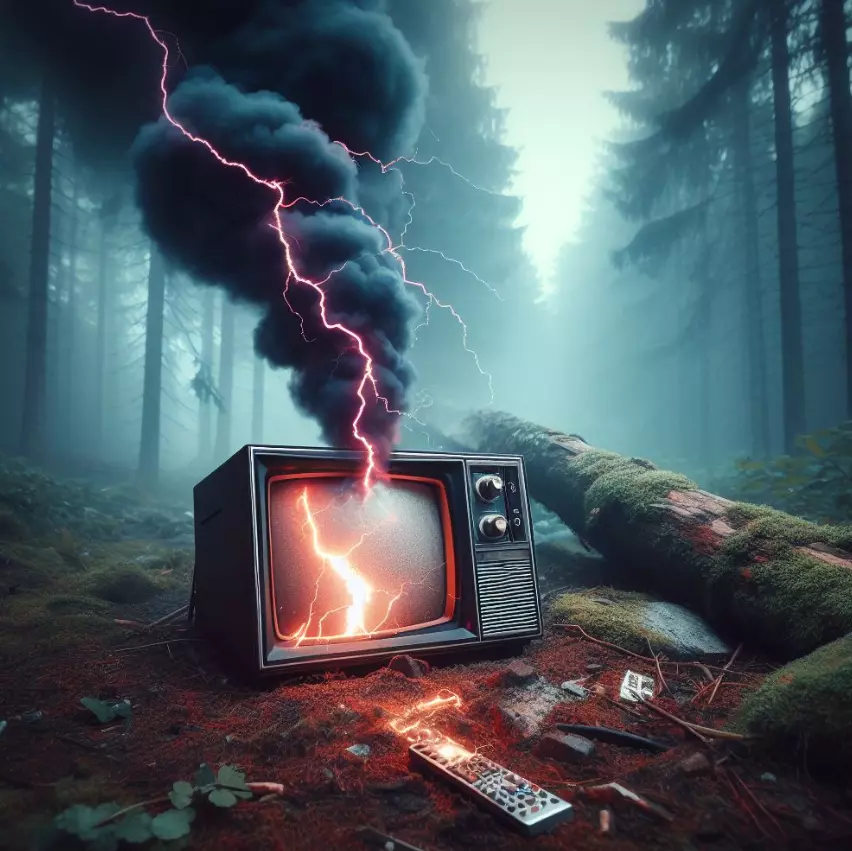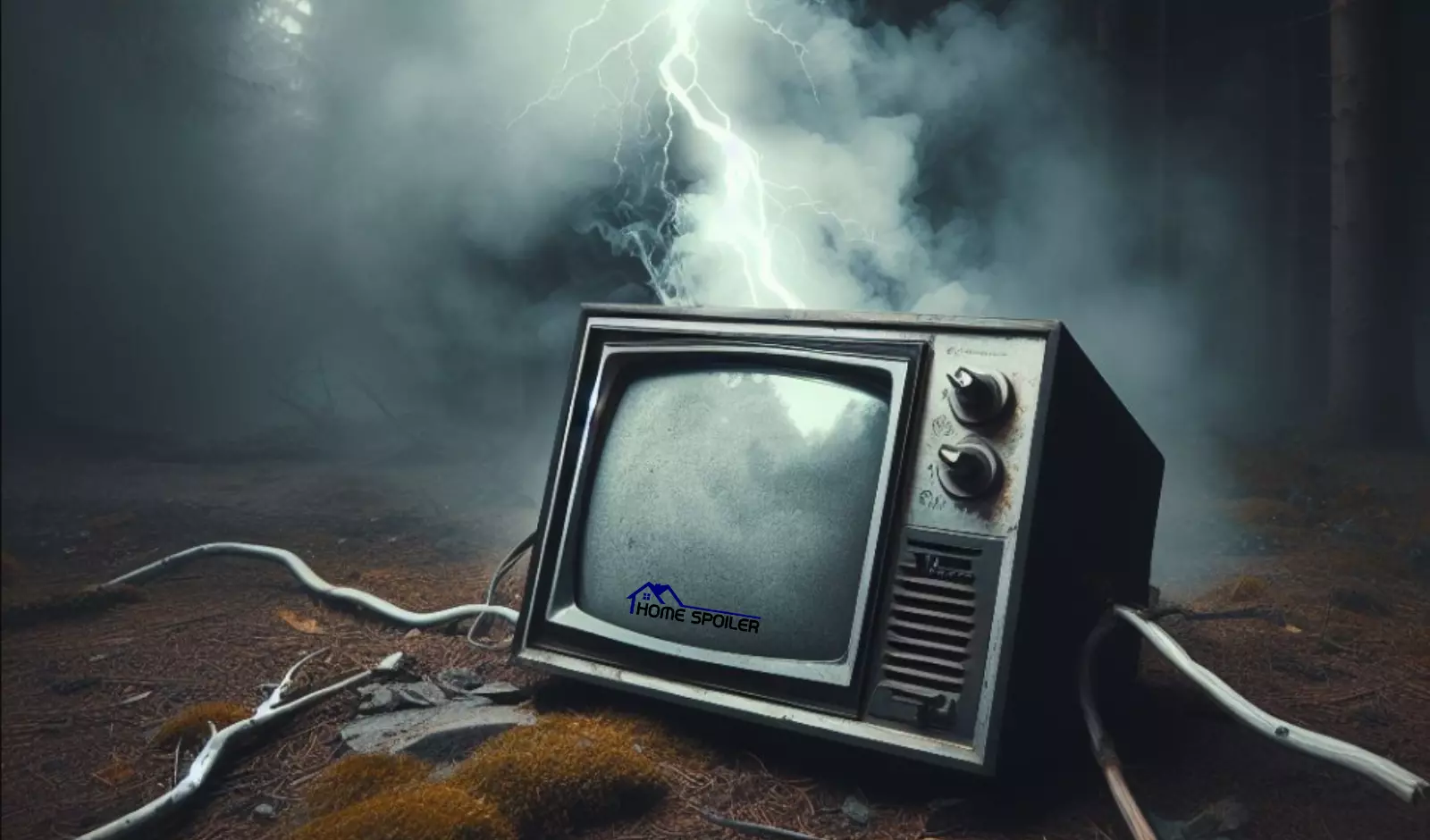Yes, lightning can damage TVs.
When lightning strikes near a TV, it causes a surge or spike in the power line, the phone line, the cable line, or the antenna that is connected to your TV.
This results in overloading, overheating, short-circuiting, or burning of the electronic components inside the TV.
Some of the common signs of lightning damage are:
- Burn marks or scorching on the device or its components.
- Blown fuses or circuit breakers.
- Damaged backlight.
- Loss of signal or distorted picture quality.
- You are getting a burning smell.
In this article, I will explain how lightning can reach your TV and cause damage, what factors influence the severity and likelihood of lightning damage, and what steps you can take to protect your TV from lightning.
Let’s dive in…
How Lightning Can Affect TV

There are basically two ways lightning can reach your TV and cause damage.
- Direct strike: This is when lightning directly hits your TV via an antenna or its power cord. This is very rare but also very destructive. It can cause severe physical damage to your TV and even start a fire.
- Nearby strike: If lightning strikes close to your house or power lines, it can create electrical currents that travel through the wires and damage your TV. This is more common than a direct hit but less destructive.
Here’s something to keep in mind!
The closer the lightning strike is to your TV, the higher the chance and degree of damage.
A direct strike is the worst-case scenario, while a nearby strike or a power surge can also cause significant damage. A distant strike or a minor surge may not affect your TV at all.
Just a Quick Heads-up: A few years ago, I had a 55-inch LG TV that was damaged by a lightning strike. It fried my TV and completely ruined my two antennas. My biggest mistake was not using a power strip and turning on the TV during a thunderstorm.
How To Prevent/Minimize Lightning Damage To Your TV

- Unplug your TV during storms.
- Avoid overloading your electrical outlets.
- Consider a grounded shield wire.
- Perform a “soft reset” if your TV stops working.
Here are the detailed guidelines:
1) Use Surge Protectors
Install high-quality surge protectors on all electrical outlets and cable/satellite TV connections where your TV and other electronics are plugged in.
Look for surge protectors with a high joule rating, and make sure they have indicator lights to show if they are still functioning properly.
Replace surge protectors if they are damaged or have taken a hit from a previous surge.
2) Disconnect Antennas and Cables
Unplug the power cord, antenna cable, HDMI cable, and LAN cable from your TV.
This will help protect your TV from indirect lightning strikes that can transmit abnormal voltages and electric currents through the cables, potentially damaging the TV
3) Install Lightning Rods
If you live in an area prone to frequent lightning strikes, consider installing lightning rods on your home.
Or you can install a grounded shield wire.
This will help divert lightning safely into the ground, reducing the risk of electrical damage to your home and its contents, including your TV.
Simply consult an electrician or a professional for this task.
F.A.Q.s
Q: Can lightning directly damage a TV?
Yes, lightning can directly damage a TV if it strikes the TV antenna, satellite dish, or the cables connected to the TV.
The electrical surge from a lightning strike can overload and fry the TV’s sensitive electronic components.
Q: Can lightning affect the TV signal or reception?
Of course!
Lightning can disrupt TV signals by causing interference or signal loss.
This is particularly common with over-the-air broadcasts through antennas or satellite TV systems.
Lightning can damage the equipment or disrupt the signal path, resulting in a loss of signal quality or complete signal loss.
Q: Can a lightning strike affect other electronics in my home, not just the TV?
Yes, lightning strikes can affect all electronics connected to your home’s electrical system.
This includes computers, appliances, and any device plugged into an outlet.
Using surge protectors and following lightning safety guidelines can help protect all your electronic devices.

Abdul Kader, a handy guy and experienced founder of a TV repair shop in Gulshan, Dhaka, Bangladesh. He is mainly an expert in understanding and repairing different types of issues with Smart TVs and providing helpful insights on how to keep them in good working order. Read his Full Story.

